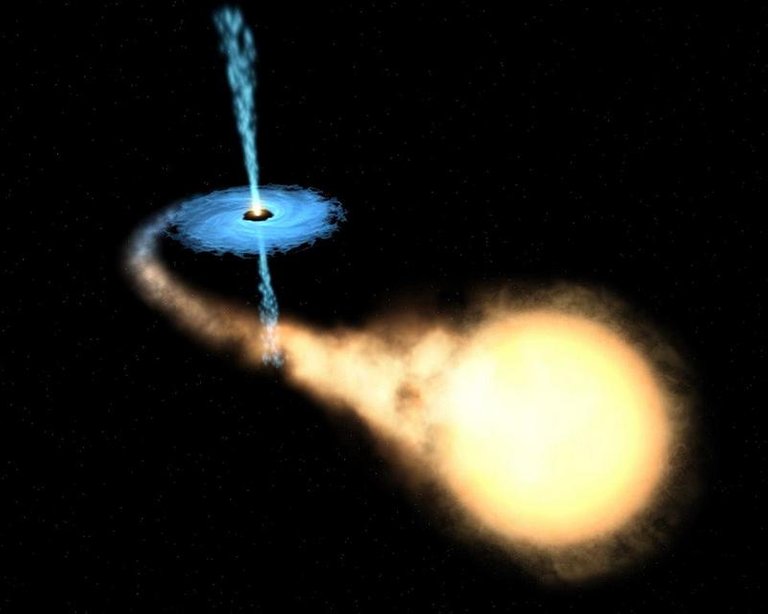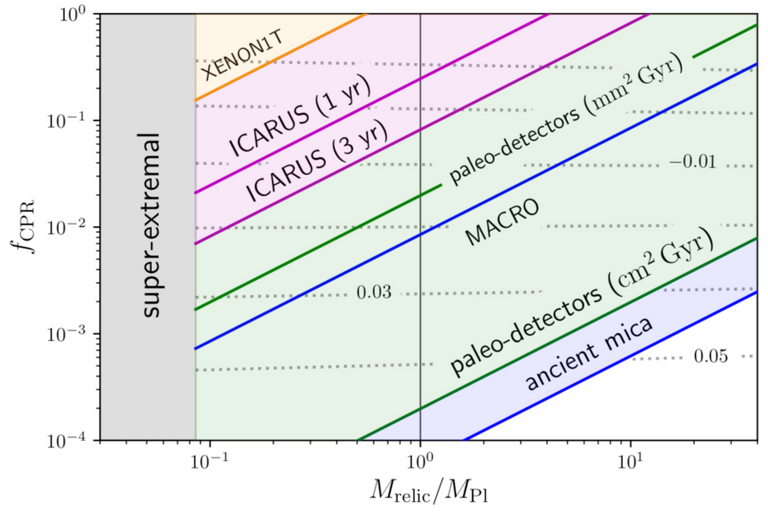What is a black hole of one billion tons?
The short answer is that it is a lite tiny black hole, and even a super light one. Most usually-considered beasts indeed weight more than dozens of solar masses, whilst a black hole of one billion tons weights in contrast 10 times less than the total amount of plastic on Earth.
But are such black holes potentially existing? This question is not as trivial as it sounds…
During its life, a black hole can solely do two things. First, it accretes matter, or in other words, it absorbs anything that goes too close to it. Second, it evaporates through Hawking radiation, or in other words it shrinks.

[image credits: @pab.ink]
From there, we have two options. Either the black hole is sufficiently heavy and accretion wins over evaporation, or it is lightish and evaporation wins over accretion. In the former case, the black hole gets bigger and bigger, whilst in the latter case, it eventually disappears. Therefore, very light black holes are not likely.
There are however some fine-prints to all of this, so that tiny black holes can actually exist. Moreover, they can even provide a solution to the problematics of dark matter, as shown in this recent scientific publication. This is the topic of today.
Black holes in a nutshell
But before moving on, let me recapitulate a few basic facts about black holes.

[image credits: Ksshd (CC BY-SA 4.0)]
A good representation of space-time in the context of general relativity and a flat universe (I wrote Universe, not Earth) is given on the left.
The universe can be seen as a huge flat rubber sheet, and all objects that it contains (stars, galaxies, etc.) as marbles.
All marbles bend the rubber sheet, with the more compact ones bending it more. All marbles are indeed different, some of them being heavier and denser than others.
In general relativity, we have exactly the same story. The universe is flat and deformed by stars and galaxies, the deformation being more important for more compact objects.

[image credits: NASA/ESA (public domain)]
Back holes consist in the limiting case in which the objects are so compact that the deformation becomes infinite.
This is the reason why one says that black holes attract and eat everything. More precisely, anything that crosses the so-called event horizon of the black hole will just fall down into it, so that the black hole mass increases.
However, as said above, black holes are also subject to Hawking radiation. Very crudely, this phenomenon can be seen as a conversion of the back hole gravitational energy, thanks to quantum mechanical effects, into real particles that are emitted away from the black hole. In other words, the mass of the black hole decreases.
Dark tiny electrically-charged black holes
Due to Hawking radiation, tiny black holes should be today fully evaporated. There is however a catch!

[image credits: NASA]
Hawking radiation is not known very well when the black hole mass is small, so that the theory could be modified without screwing up data.
Suggestions that Hawking radiation stops at some point have been made and found to be viable, as shown for instance here.
Tiny back holes could then form stable cosmological relics that interact only by gravity, and henceforth constitute the dark matter that is necessary to explain large classes of cosmological observations.
One interesting option is when the black hole is electrically charged so that it can quite easily be observed terrestrially. While dark matter has to be in principle electrically neutral, the existing constraints are avoided for very heavy dark matter.
Detecting tiny dark black holes on Earth
Tiny dark electrically-charged black holes are highly penetrating and ionizing so that they would leave tracks in a variety of running or planned to run experiments.
For instance, searches dedicated to monopoles (another class of very ionizing particles) or experiments relying on a liquid detector made from a noble element should see the passage of a tiny black hole.
As another example, paelo-detectors (i.e., very ancient stones that could have recorded the passage of dark matter millions of years ago) could also reveal hints of the potential presence of tiny black hole dark matter.

[image credits: arXiv]
The prospects of those (future) experiments are illustrated on the figure above, where one can see (without having to understand all the glory details behind the figure) that most available options for tiny black hole as dark matter will be covered in the next decades.
If this idea is the one picked by Nature, there are great chances that we will observe it very soon!
Summary
In this article, I describe an interesting scenario for dark matter.
The way black hole evaporation works is modified without screwing up any observation, so that super tiny black holes (weighting at most one billion tons) are now allowed to exist. Interestingly enough, these can be both electrically-charged and constitute of good candidate to explain dark matter in the universe.
Their electric charge is a key feature allowing existing and future (astro-)particle physics experiments to detect them a close future. This implies that within a couple of decades, we will know how crazy this idea of dark tiny electrically-charged hole is.
SteemSTEM
SteemSTEM aims to make Steem a better place for Science, Technology, Engineering and Mathematics (STEM) and to build a science communication platform on Steem.
Make sure to follow SteemSTEM on steemstem.io, Steemit, Facebook, Twitter and Instagram to always be up-to-date on our latest news and ideas. Please also consider to support the project by supporting our witnessdelegating to @steemstem for a ROI of 65% of our curation rewards (quick delegation links: 50SP | 100SP | 500SP | 1000SP | 5000SP | 10000SP). (@stem.witness) or by
In my last comment you suggested I could ask questions. I'm not sure I know enough to ask a question. I went looking on the Internet (for more info) after reading your piece to try and understand the scenarios in which a black hole could evaporate, or grow. I think I understand: if a black hole doesn't absorb enough mass to compensate for the loss from Hawking radiation, then it will evaporate. But it can grow if it absorbs enough mass to compensate for that radiation. So, a black whole is not a pit of energy absorbing everything without limit. It is limited, or can be limited, by the effect of Hawking radiation. Am I correct?
I'm fascinated by this discussion and am determined to understand the universe that is my home. Thank you! Your language and clear explanation help a great deal.
I came across an article, which to a large extend was beyond me. However, reading it helped me to grasp more the relationship between Hawking radiation and black holes. Thermal spectrum of analogue black hole puts Hawking radiation in a new light.
Unrelated to the black hole: Hawking is one of my role models. He held that we should never think of what we can't do, but what we can do. Look what he did :)
You are totally correct with your understanding of black hole growth and evaporation. This is exactly how it happens. :)
I think that this can be somehow rephrased as "even if the not so great events, one can always find something positive". No? :)
I am tickled that I understand it! Good teachers take credit...go ahead :)
The Hawking quote I was thinking of was this:
“My advice to other disabled people would be, concentrate on things your disability doesn’t prevent you doing well, and don’t regret the things it interferes with. Don’t be disabled in spirit, as well as physically.”
Coming from him, that made a profound impression on me.
Totally! :)
Hey @lemouth,
just to get it right. The universe (or the room-space) is comparable to some kind of sheet which is deformed by objects. The heavier an object is the more deformation occurs. After a certain „critical mass“ the event horizon is crossed and the objects are becoming black holes. Nevertheless, after certain conditions and complex quantum mechanical effects, the black hole stays a black hole even though there is a decrease in mass. This is basically something Stephen Hawkin has found. At the end of this effect, the black hole becomes a tiny black hole.
These tiny black holes are in contrast to dark matter charged thus you can look for these black holes and distinguish them from the dark matter around!?!
Therefore, you have an approach to studying dark matter after finding tiny black holes which also exist on earth!?!
Moreover, the „effects“ of tiny black holes are imprinted into naturally existing materials!?! Thus you can find out more about these phenomenons even if they already occurred millions of years ago!?!
The entire story is so heavy (in a positive manner) that the story itself can become a black hole!
Pretty cool, I own a book by Stephen Hawkin, I read it years ago. Maybe I should start to read it again.
Respect
Chapper
The black mini coopers of the universe :P
Correction, the Hoover vacuum cleaners of the universe!
Argh... I have never thought about them like that. Now I have a weird image in my mind :D
Hi @lemouth can dark matter be explained by large numbers of small and/or large black holes between the visible parts of the universe? Or would it show some form of signature (i.e. from Hawking Radiation)?
One of the numerous options for dark matter consist of having it made of black holes that are remanent of the primordial universe.
More precisely, those are black holes that do not originate from the collapse of a star but are instead another class of black holes that have been created during the very early days of the universe. Such black holes are in general expected to be massive. We talk about MACHOS (i.e. massive compact halo objects), although in principle the mass is a free parameters.
Then we have two things:
I hope I clarified a little. Otherwise, please come back to me!
If a small blackhole means extraordinary strength, I wonder what the power of a large blackhole will be like. Interesting.
Large black holes are the real monsters of our universe, attracting everything. However, the one that is the closest to us lives quite far away, so that we are safe for a bunch of years :)
I really like this entry. Definitely easy to understand why considering tiny black holes is way more nuanced than it might seem.
Thanks a lot for the nice words. I unfortunately didn't find the time to read your post (to my defense, I was traveling to Germany today, and had a remote admin peak in Paris ;) ). But I will, believe me!
Your post was mentioned in the Steem Hit Parade in the following category:Congratulations @lemouth!
Hi @lemouth!
Your post was upvoted by Utopian.io in cooperation with @steemstem - supporting knowledge, innovation and technological advancement on the Steem Blockchain.
Contribute to Open Source with utopian.io
Learn how to contribute on our website and join the new open source economy.
Want to chat? Join the Utopian Community on Discord https://discord.gg/h52nFrV
Congratulations @lemouth! You have completed the following achievement on the Steem blockchain and have been rewarded with new badge(s) :
You can view your badges on your Steem Board and compare to others on the Steem Ranking
If you no longer want to receive notifications, reply to this comment with the word
STOPVote for @Steemitboard as a witness to get one more award and increased upvotes!